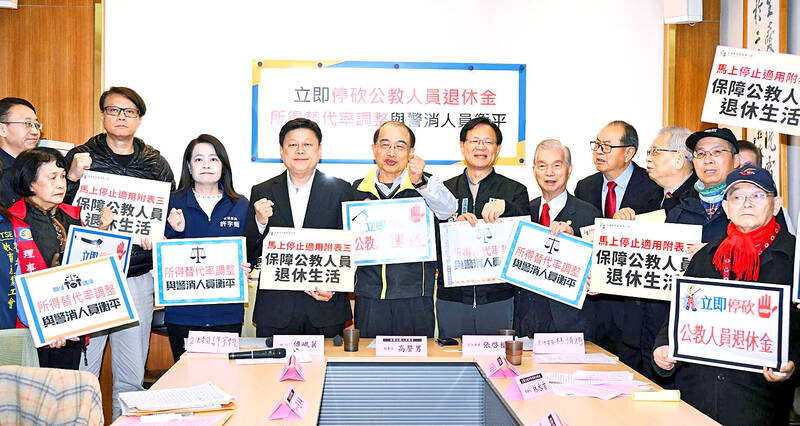The National Civil Servant Association yesterday demanded that the government roll back policies on educators’ and civil servants’ retirement income replacement ratios and adjust their ratios to match the newly amended replacement ratio ceiling for police officers and firefighters.
The Legislative Yuan on Tuesday passed amendments to the Police Personnel Management Act (警察人員人事條例), raising the maximum income replacement ratio to 80 percent for police officers, firefighters, and members of the coast guard and National Air Service Corps serving 36 years or more.
The pension reforms of 2018 had initially targeted laborers, educators, civil servants and the military, but removed laborers and the military from the reforms, association chairman Kao Shih-nan (高誓男) told a news conference yesterday.

Photo: Lin Hsin-han, Taipei Times
Removing police and firefighters from the reforms while stating that the Labor Pension Fund receiving additional subsidies “was a reform” shows that the reforms are unjust and undermine educators’ post-retirement security, he said.
The reforms have increased vocational confrontation and introduced social discord, he said.
The jobs of civil servants and educators provide social stability and smooth governance, and their pension should see a reasonable guarantee, instead of being reduced year on year, he said, urging the government to review the pension system for the military, civil servants and educators to ensure equality.
A reasonable income replacement ratio would ensure that civil servants and educators would have enough to maintain basic needs post-retirement, he added.
Chinese Nationalist Party (KMT) Legislator Fu Kun-chi (傅崑萁), who attended the news conference, said the nation would only improve if top-quality talent entered its service.
No one of decent education would want to work in a government where the state bullies its civil servants, and the government stands to suffer if it is managed by officials of inferior quality, he said.
The government has the wherewithal to extend good care to its public servants, he said.
If the ruling Democratic Progressive Party (DPP) continues to reduce civil servants’ pensions citing the imminent insolvency of the pension fund, it is evident that the party is not equipped to rule the country and another party should be given an opportunity, he said.
Taiwan People’s Party Legislator Chang Chi-kai (張啟楷) said there is a significant investment-return rate for the pension fund, and the government’s finances are in the green year-on-year, demonstrating full capability to increase the retirement income replacement ratio for civil servants and educators.
The government should reverse its reduction of civil servant and educator retirement income replacement ratios, and amend laws to guarantee the quality of post-retirement life for these two groups, Chang said.
Honorary chairman of the Joint Association for Civil Servants, Educators, Military, Police and Firefighters Liu Sheng-liang (劉盛良) said public servants and educators must receive fair treatment regarding their pensions.

A preclearance service to facilitate entry for people traveling to select airports in Japan would be available from Thursday next week to Feb. 25 at Taiwan Taoyuan International Airport, Taoyuan International Airport Corp (TIAC) said on Tuesday. The service was first made available to Taiwanese travelers throughout the winter vacation of 2024 and during the Lunar New Year holiday. In addition to flights to the Japanese cities of Hakodate, Asahikawa, Akita, Sendai, Niigata, Okayama, Takamatsu, Kumamoto and Kagoshima, the service would be available to travelers to Kobe and Oita. The service can be accessed by passengers of 15 flight routes operated by

Alain Robert, known as the "French Spider-Man," praised Alex Honnold as exceptionally well-prepared after the US climber completed a free solo ascent of Taipei 101 yesterday. Robert said Honnold's ascent of the 508m-tall skyscraper in just more than one-and-a-half hours without using safety ropes or equipment was a remarkable achievement. "This is my life," he said in an interview conducted in French, adding that he liked the feeling of being "on the edge of danger." The 63-year-old Frenchman climbed Taipei 101 using ropes in December 2004, taking about four hours to reach the top. On a one-to-10 scale of difficulty, Robert said Taipei 101

MORE FALL: An investigation into one of Xi’s key cronies, part of a broader ‘anti-corruption’ drive, indicates that he might have a deep distrust in the military, an expert said China’s latest military purge underscores systemic risks in its shift from collective leadership to sole rule under Chinese President Xi Jinping (習近平), and could disrupt its chain of command and military capabilities, a national security official said yesterday. If decisionmaking within the Chinese Communist Party has become “irrational” under one-man rule, the Taiwan Strait and the regional situation must be approached with extreme caution, given unforeseen risks, they added. The anonymous official made the remarks as China’s Central Military Commission Vice Chairman Zhang Youxia (張又俠) and Joint Staff Department Chief of Staff Liu Zhenli (劉振立) were reportedly being investigated for suspected “serious

Taiwanese and US defense groups are collaborating to introduce deployable, semi-autonomous manufacturing systems for drones and components in a boost to the nation’s supply chain resilience. Taiwan’s G-Tech Optroelectronics Corp subsidiary GTOC and the US’ Aerkomm Inc on Friday announced an agreement with fellow US-based Firestorm Lab to adopt the latter’s xCell, a technology featuring 3D printers fitted in 6.1m container units. The systems enable aerial platforms and parts to be produced in high volumes from dispersed nodes capable of rapid redeployment, to minimize the risk of enemy strikes and to meet field requirements, they said. Firestorm chief technology officer Ian Muceus said